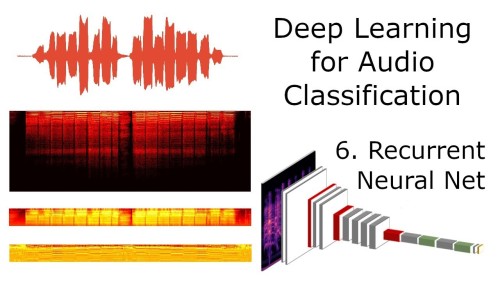
Published 8/2024
Created by Ahmed Qusay
MP4 | Video: h264, 1280×720 | Audio: AAC, 44.1 KHz, 2 Ch
Genre: eLearning | Language: English | Duration: 34 Lectures ( 4h 37m ) | Size: 4.44 GB
What you’ll learn:
Define the real Audio Environments to record clips for Machine Learning Model Prediction.
Compose Negative and Positive Audio Clips for Machine Learning use.
Inject "Audio Keyword" to trigger RASPI 5 processor action in Positive Audio Clips.
Slice an Audio file into several Audio Clips for Neural Net feeding.
Apply the 5 Stages of Raw Audio Preparation for Neural Net use (load, time domain, frequency domain, spectrogram, and resize).
Use Librosa, Spectrogram, and Decibel of raw Audio for Neural Net use.
Apply Labeling Audio Clips as Positive Audio and Negative Audio for the use of Neural Net Training.
Slicing, Labeling, and Batching Audio Clips for Neural Net use.
Use Google Colab to create a Python Program with Convolutional Neural networks for Audio Classification and Prediction to be saved as an H5 AI Model.
Assemble the Raspberry Pi 5 and other Hardware Devices for Audio Prediction use.
Install Raspberry Pi 5 Software Requirements, including the Operating System, VNC viewer, Librosa, Tensorflow, and more.
Use FileZilla to transfer the H5 AI Model to be saved in Raspberry Pi 5.
Deploy and Run the H5 AI Model inside the Raspberry Pi 5 and make the Audio Prediction.
Use the Raspberry Pi 5 Audio Prediction to control the movement of the Servo Motor.
Requirements:
Basic knowledge of Python and basic knowledge of AI.
Description:
This course is designed to provide a real understanding of handling audio files in machine learning. This course will give you a complete track record of processing audio files from A to Z using Python. This course will explain how to use Convolutional Neural Networks to generate an H5 AI model for audio classification purposes. This course gives you a complete understanding of Raspberry Pi 5 assembly, programming, AI Model deployment, and prediction of audio files. We will learn how to identify audio environments for machine-learning purposes. We will learn how to record audio files and slice them into clips of positive and negative types. How to process the raw audio clips and inject the "keyword" to be detected by the neural network. Apply clip labeling, clip slicing, and clip batching for the preparation of feeding audio clips to the Neural Net. Apply the required stages (load, time domain, frequency domain, spectrogram, and resize) to process raw audio clips for prediction use. Use Python programming to generate an H5 AI model for audio prediction purposes. Deploy and run the H5 AI model inside the Raspberry Pi 5 to control the movement of the servo motor with audio order. Testing the model with a real-time audio prediction process.
Who this course is for:
Everyone needs a comprehensive understanding of audio file manipulation in machine learning.
Everyone needs a comprehensive understanding of audio file manipulation in Python.
Everyone needs a comprehensive understanding of audio file manipulation with Raspberry Pi 5.
rapidgator.net/file/95ce3726521a89940fbdde0d64b1713b/Audio_Classification_using_Convolutional_Neural_Net.part1.rar.html
rapidgator.net/file/cd9fada20f7fba4fcf9fa843768e1298/Audio_Classification_using_Convolutional_Neural_Net.part2.rar.html
rapidgator.net/file/fe7baa4df10c7692939bdba6e5431f0d/Audio_Classification_using_Convolutional_Neural_Net.part3.rar.html
rapidgator.net/file/815ce83e29431cc009fe1ba8db0c737d/Audio_Classification_using_Convolutional_Neural_Net.part4.rar.html
rapidgator.net/file/e8a91b68f686c7968cf8a85da84061f6/Audio_Classification_using_Convolutional_Neural_Net.part5.rar.html

